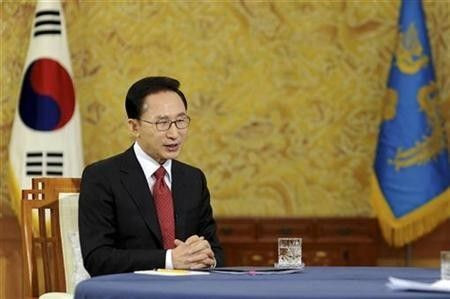South Korea's conciliatory Lee hints at summit with North

South Korean President Lee Myung-bak said on Tuesday he had high hopes for the first inter-Korean talks in months, marking a significant softening in tone and holding out the possibility of a summit with North Korea.
Tension has eased on the divided peninsula since the two Koreas last month agreed to talks about the bombardment of a South Korean island by the North in November, as well the sinking of a South Korean warship last March. The two attacks killed 50 people.
I don't deny it, Lee said when asked during a television interview if progress at upcoming talks could possibly lead to a summit. We can have a summit if needed.
The North and South have only held two summits, in 2000 and 2007.
Regional powers have nudged the rivals, still technically at war having signed a truce rather than a peace treaty to end the 1950-53 Korean War, back to the negotiating table to try to defuse the crisis and pave the way for the resumption of stalled aid-for-disarmament talks.
The two sides agreed on Tuesday to hold preliminary military talks at the border on February 8 to set the agenda for higher-level talks, possibly at the ministerial level.
Next week's colonel-level talks at the Panmunjom truce village will be the first dialogue between the two Koreas since last September.
We plan to start working-level dialogue and test North Korea's seriousness, Lee said. Whether it is the six-party talks or South-North talks, North Korea must first change its position.
North Korea walked out of so-called six-party talks, that included South Korea, the United States, Japan, Russia and China, aimed at getting it to give up its nuclear weapons programme, in late 2008.
Lee cut off a decade of unconditional aid to the North when he took office that year, angering Pyongyang, and he has demanded the isolated neighbour end its nuclear programmes if it wanted Seoul to get back to commercial exchange and giving aid.
Lee said he had high expectations that the North would abandon the path it had taken in the past of staging hostile acts to raise tension, then seeking dialogue with the wealthy South to win concessions.
I believe this is a good opportunity for the North, that it is engaging in dialogue with the South at this point, he said. I have high expectations that (the North will realise) it is time for change.
Lee's conciliatory tone and the North's appeals for talks mark a significant shift from the warlike rhetoric bandied between the neighbours at the end of last year.
The two Koreas have agreed to discuss the Yeonpyeong island attack and the sinking of the South's warship which Seoul has blamed on the North.
The North says the South provoked the island attack by test-firing shells into its waters, and says it had nothing to do with the sinking of the Cheonan warship. Analysts say it is unlikely it will change its stance during the talks.
The South has also proposed separate talks to gauge the North's sincerity about denuclearisation, the key component of the stalled six-party talks.
The North has yet to respond to the proposal for bilateral nuclear talks.
© Copyright Thomson Reuters {{Year}}. All rights reserved.




















